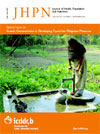
|
The Journal of Health, Population and Nutrition
icddr,b
ISSN: 1606-0997
EISSN: 1606-0997
Vol. 37, No. 1, 2018, pp. 1
|
 Bioline Code: hn18021
Bioline Code: hn18021
Full paper language: English
Document type: Research Article
Document available free of charge
|
|
|
The Journal of Health, Population and Nutrition, Vol. 37, No. 1, 2018, pp. 1
| en |
Health system barriers influencing perinatal survival in mountain villages of Nepal: implications for future policies and practices
Paudel, Mohan; Javanparast, Sara; Newman, Lareen & Dasvarma, Gouranga
Abstract
Background: This paper aims to examine the health care contexts shaping perinatal survival in remote mountain
villages of Nepal. Health care is provided through health services to a primary health care level—comprising district
hospital, village health facilities and community-based health services. The paper discusses the implications for future
policies and practice to improve health access and outcomes related to perinatal health. The study was conducted in
two remote mountain villages in one of the most remote and disadvantaged mountain districts of Nepal. The district is
reported to rank as the country’s lowest on the Human Development Index and to have the worst child survival rates.
The two villages provided a diversity of socio-cultural and health service contexts within a highly disadvantaged region.
Methods: The study findings are based on a qualitative study of 42 interviews with women and their families who had
experienced perinatal deaths. These interviews were supplemented with 20 interviews with health service providers,
female health volunteers, local stakeholders, traditional healers and other support staff. The data were analysed
by employing an inductive thematic analysis technique.
Results: Three key themes emerged from the study related to health care delivery contexts: (1) Primary health
care approach: low focus on engagement and empowerment; (2) Quality of care: poor acceptance, feeling unsafe
and uncomfortable in health facilities; and (3) Health governance: failures in delivering health services during pregnancy
and childbirth.
Conclusions: The continuing high perinatal mortality rates in the mountains of Nepal are not being addressed due to
declining standards in the primary health care approach, health providers’ professional misbehaviour, local health
governance failures, and the lack of cultural acceptance of formalised care by the local communities. In order to
further accelerate perinatal survival in the region, policy makers and programme implementers need to immediately
address these contextual factors at local health service delivery points.
Keywords
Perinatal death; Stillbirth; Health governance; Quality of care; Primary health care; Maternity care; Disadvantage; Nepal
|
| |
© Copyright 2018 - The Author(s)
Alternative site location: http://www.jhpn.net
|
|
